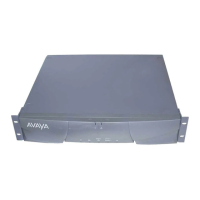Maintenance-Object Repair Procedures
555-233-143
8-1048 Issue 1 May 2002
3. At the command prompt, type ping nnn.nn.nn.nn (the external IP trunk
server’s address), and press
Enter.
If configured correctly, the system displays:
Reply from nnn.nn.nn.nn: bytes=32 time<##ms TTL=###
If there is no reply, verify the IP address and check the physical
connections to and from the TN802 circuit pack.
4. At the command prompt, type ping nnn.nn.nn.nn (the IP address of
another computer on the network), and press
Enter.
If configured correctly, the system displays:
Reply from nnn.nn.nn.nn: bytes=32 time<##ms TTL=###
If there is no reply:
a. Verify the IP address.
b. Check the physical connections to and from the TN802 circuit pack.
c. Check the internal cables on the TN802 circuit pack (Notes 4 and 6
in Figure 8-58 on page 8-1051).
d. Try pinging another device in the same subnet.
e. Try pinging the gateway to the rest of the network from the subnet.
f. Try pinging a device outside the local subnet but inside the network
or another subnet.
5. When finished, type exit at the command prompt, and press
Enter.
Internal Connections to the LAN
Test the internal connections to the LAN by pinging the local host, an internal IP
trunk server, and another device connected to the network.
1. Click Start in Windows (lower left-hand corner), then select Programs,
then Command Prompt.
This starts a DOS command-line session.
2. At the command prompt, type ping 127.0.0.1 (the local host’s default
address), and press
Enter.
If configured correctly, the system displays:
Reply from nnn.nn.nn.nn: bytes=32 time <##ms TTL=###
If there is no reply:
a. Check that the internal cables on the TN802 circuit pack (Notes 4
and 6 in Figure 8-58) have not worked loose.
b. Otherwise, replace the circuit pack.

